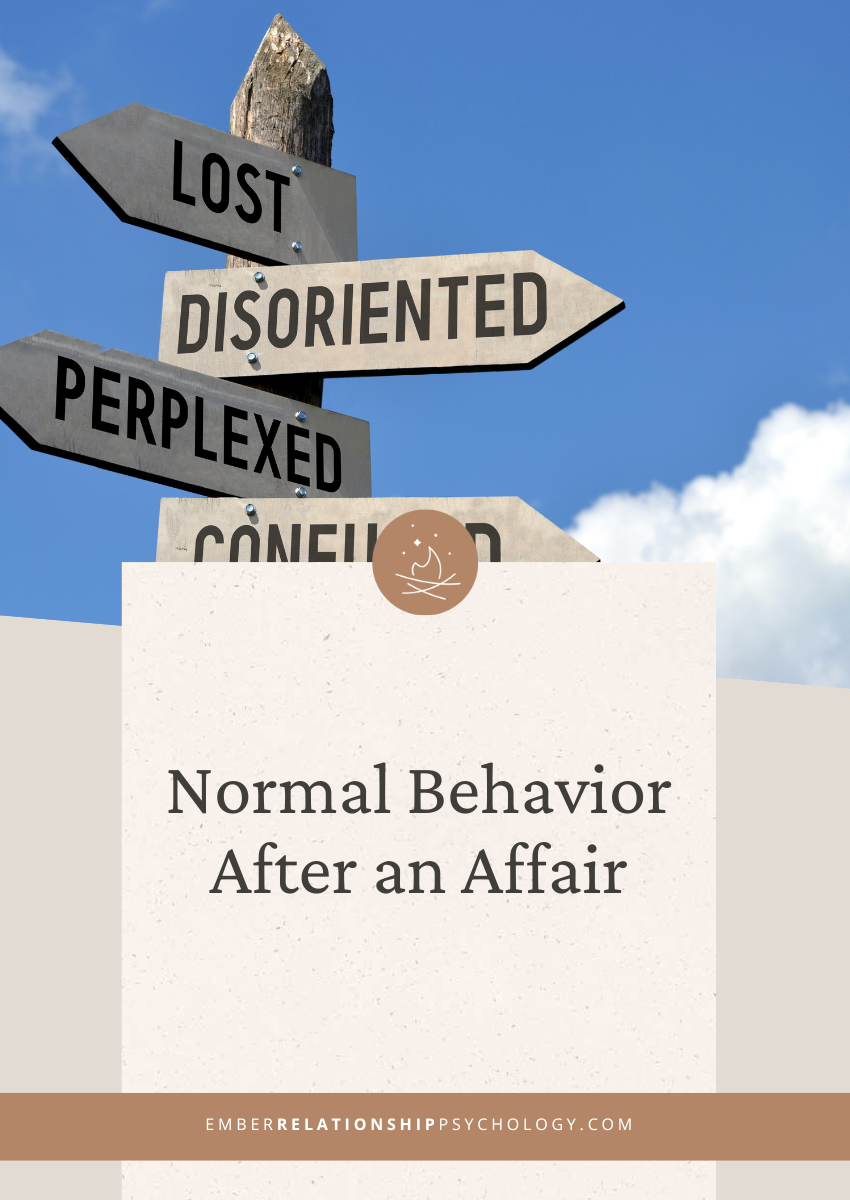Normal Behavior After an Affair
Working Through Chaos
By Amber Dalsin + Chat GPT
Infidelity is one of the most emotionally traumatic experiences anyone can go through. It’s so hard. Whether you are the one who was betrayed or the one who betrayed, the aftermath is filled with confusion, anger, hurt, and a deep need for answers.
In the wake of an affair, it’s important to understand that many of the behaviors you might experience are completely normal and part of the emotional fallout that comes with betrayal. It can feel like you’re “acting crazy”. But you’re not, you’re behaving normally after something abnormal happened to you.
In this blog, we’ll explore some of the typical behaviors people exhibit after an affair, providing insight into what might feel overwhelming or out of control, but is in fact, a natural response to emotional trauma.
1. Repeatedly Asking "Why?"
When an affair is discovered, the need for answers can be all-consuming. People often ask the same questions over and over: “Why did this happen?” or “How could you do this to me?” It’s normal to repeatedly search for the reasons behind the betrayal in an attempt to make sense of what feels senseless.
Searching for clarity: The betrayed partner often feels an insatiable need for an explanation, looking for any shred of understanding. You may want to know everything, from the circumstances of the affair to your partner’s emotions during that time. These repeated questions come from a deep desire to comprehend what led to this breach of trust.
Feeling lost and confused: If you’ve been cheated on, it may feel like the world as you knew it has been turned upside down. You need reassurance and understanding, even if it takes asking the same questions multiple times in the hopes of receiving a different answer that might make sense of everything.
2. Emotional or Physical Withdrawal
After the discovery of an affair, emotional or physical withdrawal is common. You may find yourself emotionally or physically pulling away from your partner, either because you're too hurt to engage or because you're trying to protect yourself from further pain.
The silent treatment: One way people cope with the betrayal is by shutting down, often giving their partner the silent treatment. This is a way to protect oneself from the emotional onslaught of anger, pain, and sadness that accompanies the discovery of infidelity.
Seeking distance: You may decide to physically remove yourself from the relationship, either by staying somewhere else or avoiding shared spaces in the home. This physical distance can help you regain some sense of control over a situation that feels completely out of your hands.
3. Seeking Connection: Wanting Reassurance
Despite the emotional pain, it’s normal to still seek reassurance from your partner after an affair. The need for love and affection doesn’t simply disappear because trust has been broken. Instead, you might find yourself reaching out for comfort in the form of cuddling, affection, or intimacy.
Seeking intimacy: You might crave physical affection—asking your partner if they still love you, or even seeking sexual connection as a way to reaffirm the bond you once shared. This can be an attempt to re-establish closeness and security, even if trust is still in question.
Emotional vulnerability: You may find yourself needing to hear comforting words, assurances that the love is still there, or asking for validation that the relationship is worth salvaging. This behavior comes from a deep emotional need for connection after feeling rejected and betrayed.
4. Detached and Disconnected Behavior
Infidelity can trigger feelings of emotional numbness or detachment. You may find yourself zoning out, feeling disconnected from your surroundings, or even forgetting what you're doing. This dissociation can be a defense mechanism, a way to cope with overwhelming emotions by shutting down temporarily.
Staring into space or losing focus: You might find yourself zoning out, staring at nothing, or forgetting what you were in the middle of doing. This can happen when the weight of the situation becomes too much to process all at once.
Wandering or feeling "lost": It’s not uncommon to physically wander, moving aimlessly from place to place, without a clear sense of direction. Your mind might be too preoccupied with the emotional turmoil to focus on any one thing for long.
5. Checking for the Truth: Searching for Evidence
When trust is shattered, it’s normal to feel compelled to seek out evidence to verify your partner’s story. You may find yourself checking their phone, emails, or social media accounts in an attempt to piece together the truth and confirm what your partner is saying.
Investigating the affair: The urge to look for more clues or check up on your partner’s actions becomes almost compulsive. You might find yourself revisiting old conversations or scrutinizing small details to see if there’s any discrepancy in their version of events.
Suspicion and distrust: Even after a conversation about the affair, you might feel the need to keep checking on them. It’s not about mistrusting the person, but rather the betrayal itself has created a sense of doubt that is difficult to shake.
6. Physical Acting Out: Anger and Desperation
The emotional pain and confusion that come with infidelity can sometimes lead to physical expressions of anger or frustration. This is not about condoning violence, but it’s important to understand that when people feel violated or powerless, they may act out in ways that are out of character. Do your best to avoid physical acts of violence. It makes a bad situation worse.
Screaming or swearing: Anger often bubbles to the surface in the wake of an affair, and you might find yourself screaming, swearing, or saying things you don’t mean.
Property destruction: Some people might lash out physically by throwing things or damaging property. This behavior can be a release of pent-up emotion, though it’s important to seek healthier ways to manage anger.
Violence or threats: In the most extreme cases, emotional pain may manifest in violence, either directed toward your partner or yourself. This is a sign of deep emotional distress, and it’s important to seek professional help immediately if you feel like you're in danger or losing control.
Moving Forward: Understanding and Healing
After an affair, emotions are raw and the pain can feel unbearable. The behaviors listed above are common responses to the shock, grief, and anger that come with infidelity. However, while these behaviors are normal, they can also be harmful if left unaddressed.
Healing begins with acknowledging these feelings and behaviors, allowing yourself time to process the emotions. Whether through therapy, communication, or taking time apart, understanding that this emotional turmoil is part of the journey is key to healing. If you are the one who has been betrayed, be gentle with yourself as you navigate this difficult path. If you are the one who committed the betrayal, it is essential to take responsibility for your actions and work toward rebuilding trust.
No matter how painful, these emotions are a natural part of the process, and with time, patience, and support, both partners can begin to heal and move forward—whether together or apart.
This blog is not meant to be a substitute for couples therapy or relationship counselling. This should not be construed as specific advice. See a relationship therapist in your area to address your specific problems.


